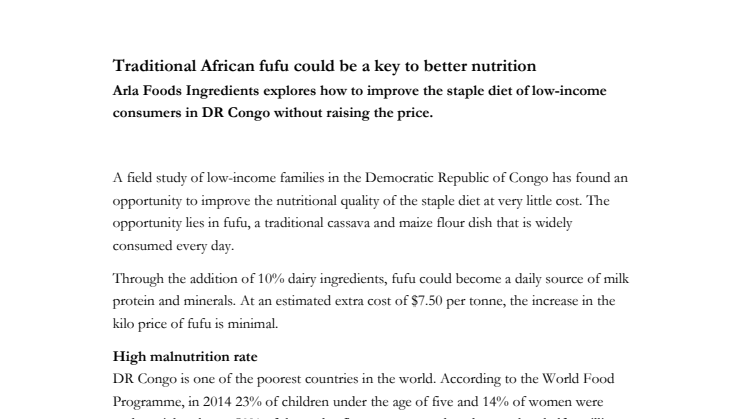News -
Traditional African fufu could be a key to better nutrition
Arla Foods Ingredients explores how to improve the staple diet of low-income consumers in DR Congo without raising the price.
A field study of low-income families in the Democratic Republic of Congo has found an opportunity to improve the nutritional quality of the staple diet at very little cost. The opportunity lies in fufu, a traditional cassava and maize flour dish that is widely consumed every day.
Through the addition of 10% dairy ingredients, fufu could become a daily source of milk protein and minerals. At an estimated extra cost of $7.50 per tonne, the increase in the kilo price of fufu is minimal.
High malnutrition rate
DR Congo is one of the poorest countries in the world. According to the World Food Programme, in 2014 23% of children under the age of five and 14% of women were underweight, almost 50% of the under-fives were stunted, and more than half a million pregnant or breastfeeding women suffered from acute malnutrition.
To investigate the potential to improve this situation using dairy ingredients, Arla Foods Ingredients conducted interviews with 30 consumers living in the DR Congo capital, Kinshasa earlier this year. This revealed that an average household includes four children and spends $6 a day on food.
All but one of the people interviewed stated that they consume fufu at least once a day. The exception was a woman who prepared fufu for her family but did not eat it herself.
“Fufu is part of the staple diet in many African countries. In the Congo, men say they have to eat it every day otherwise they can’t sleep. People know fufu is not very nutritious but it keeps them from going hungry,” says Man Kasiama Ebaba, who conducted the study for Arla Foods Ingredients.
Protein and mineral enrichment
Application trials in the Arla Foods Ingredients laboratory have shown that the addition of skimmed milk powder and whey permeate can enrich the protein and mineral content of fufu without altering the overall taste and texture.
“The taste is slightly sweeter but, in our small-scale tests with people who eat fufu regularly, likeability was high,” Man Kasiama Ebaba states.
“Our conclusion is that fufu has strong potential for enrichment at no significant extra cost to consumers.”
During his fact-finding trip to DC Congo, Ebaba approached several companies to gauge local interest in producing a nutritionally-enriched fufu. These discussions are ongoing.
Models for responsible business
Prior to the DC Congo study, Arla Foods Ingredients conducted a similar investigation of affordable food opportunities in Bangladesh.
“The affordable food segment represents an opportunity for us to pursue our responsible business goals. We are currently developing new business models for the supply of sustainable, low-cost solutions that give low-income consumers better access to good nutrition,” says senior project manager at Arla Foods Ingredients, Charlotte Sørensen.
Arla Foods Ingredients is a member of the GAIN Nordic Partnership, which aims to develop affordable and nutritious foods in partnership with local manufacturers.
For more information, contact ingredients@arlafoods.com or clcik here.
Topics
- Groceries, Food engineering
Categories
- whey protein
- permeate
- affordable food
- afforablefood_industry

